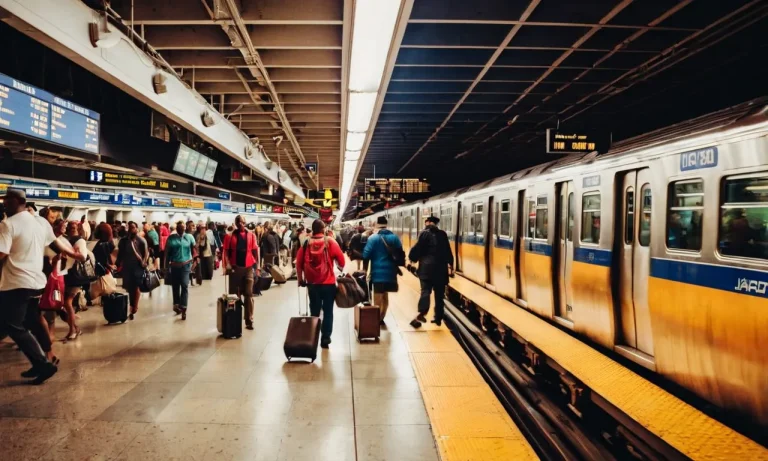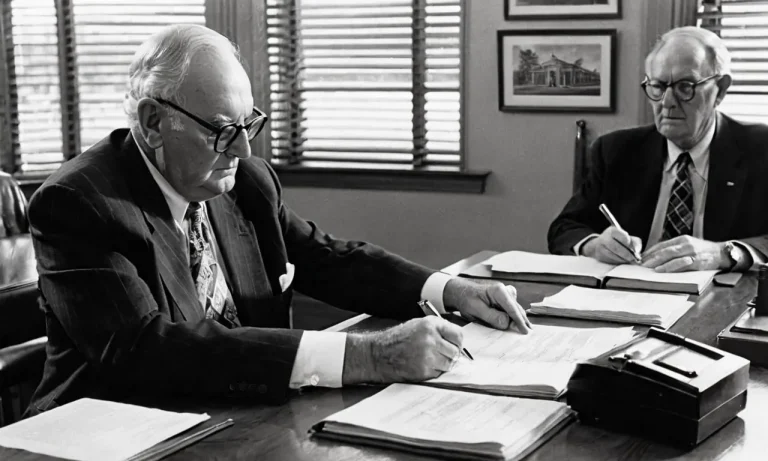Will Delta Rebook You On Another Airline?
When your Delta flight gets canceled or excessively delayed, you may wonder if Delta will rebook you on another airline to get you to your destination. With air travel being as unpredictable as ever these days, this is a common question for many Delta passengers.
If you’re short on time, here’s a quick answer: Delta does not typically rebook passengers on other airlines, even in the event of cancellations and delays. As an airline, Delta seeks to re-accommodate passengers through their own network of flights, rather than booking passengers on competitors’ flights.
In this comprehensive guide, we will cover Delta’s policies relating to rebooking, including details on when Delta may consider rebooking on partners or other airlines. We’ll also provide tips on steps you can take if Delta will not rebook you and you need to get to your destination urgently.
Delta’s Rebooking and Partner Airline Policies
Rebooking During Disruptions
In the event of disruptions such as flight cancellations or delays, Delta Airlines has a comprehensive rebooking policy in place to ensure that their passengers reach their destinations as smoothly as possible.
Delta will generally rebook passengers on their own flights or offer alternative options on partner airlines if necessary. This is done to minimize inconvenience and provide the best possible travel experience for their customers.
Delta Partner Airlines
Delta Airlines has established partnerships with a number of other airlines around the world, allowing them to offer an extensive network of routes and destinations. Some of their major partner airlines include Air France, KLM, Virgin Atlantic, and Korean Air.
These partnerships enable Delta to rebook passengers on partner flights when necessary, ensuring that they can still reach their intended destinations even if there are disruptions to Delta’s own flights.
When Rebooking on Partners May Occur
Rebooking on partner airlines may occur in situations where Delta’s own flights are unavailable or disrupted. This could be due to factors such as severe weather conditions, technical issues, or other unforeseen circumstances.
When rebooking on partner airlines, Delta aims to prioritize their customers’ convenience and minimize any disruptions to their travel plans. Passengers will be provided with alternative flights on partner airlines that align with their original itineraries as closely as possible.
It’s important to note that rebooking on partner airlines is subject to availability and may not always be guaranteed. However, Delta Airlines makes every effort to accommodate their passengers and ensure they reach their destinations with minimal disruption.
For more information on Delta’s rebooking policies and partner airlines, you can visit their official website Delta.com. It’s always a good idea to familiarize yourself with these policies before your trip to be prepared for any potential disruptions that may arise.
Steps to Take if Delta Won’t Rebook You
If you find yourself in a situation where Delta Airlines is unable to rebook you on another flight, don’t panic. There are several steps you can take to ensure you reach your destination without any major hiccups. Here are some options to consider:
Request a Refund from Delta
If Delta is unable to rebook you on another flight, your first course of action should be to request a refund. Delta has a refund policy in place for situations where they are unable to provide an alternate flight.
You can contact Delta’s customer service or visit their official website to initiate the refund process. It’s important to have all your booking details and documentation ready when making the refund request.
Book a New Flight Yourself
If Delta is unable to offer a suitable alternative flight, taking matters into your own hands by booking a new flight is another option. By doing so, you can ensure that you reach your destination as soon as possible.
There are numerous online travel websites and platforms that allow you to search for and book flights from various airlines. You can compare prices, flight times, and choose an option that works best for you.
However, keep in mind that the cost of the new flight may not be covered by Delta, so it’s advisable to check their refund policy and any potential compensation options before booking.
Explore Other Transport Options
If all else fails, and you’re unable to secure a refund or find a suitable alternative flight, it may be time to explore other transportation options. Depending on your destination and proximity, you can consider traveling by train, bus, or even renting a car.
While these options may take longer or be less convenient than flying, they can still get you to your destination. It’s important to weigh the pros and cons, consider the cost, and factor in the time it will take to reach your destination using these alternative modes of transportation.
Remember, it’s always a good idea to stay calm and courteous when dealing with airline representatives. They are there to assist you and find a solution to your travel woes. By following these steps and exploring your options, you increase your chances of reaching your destination smoothly, even if Delta is unable to rebook you on another airline.
Tips for Navigating Rebooking During Disruptions
When facing flight disruptions, such as delays or cancellations, it can be frustrating and overwhelming to figure out how to get rebooked on another airline. However, there are a few tips and strategies that can help you navigate the rebooking process with ease.
Be Flexible with Dates/Times/Routes
One of the most important things to remember when trying to get rebooked on another airline is to be flexible with your travel plans. Airlines often have limited availability on other carriers, so being open to adjusting your dates, times, or even routes can greatly increase your chances of finding an alternative flight.
Consider if a slight change in your itinerary is worth avoiding a long delay or cancellation.
Additionally, being flexible with your travel plans may also give you more options when it comes to choosing an alternative airline. Some airlines have partnerships or alliances that allow for easier rebooking on their partner carriers.
For example, Delta Air Lines is a member of the SkyTeam alliance, which includes other major airlines like Air France, KLM, and Korean Air. Being open to flying with one of these partner airlines can greatly simplify the rebooking process.
Use the Fly Delta App
The Fly Delta app is a valuable tool for travelers, especially during disruptions. The app allows you to easily manage your reservations, receive real-time updates on your flight status, and even rebook on alternate flights.
By having the app installed on your smartphone, you can quickly access all the necessary information and take immediate action if your flight is disrupted.
Furthermore, the Fly Delta app often provides passengers with priority access to rebooking options. This means that you may have a higher chance of securing a seat on another airline if you use the app to rebook rather than waiting in line at the airport.
The app also provides helpful notifications and alerts, ensuring that you stay informed throughout the rebooking process.
Call Delta Directly
If you’re unable to find a suitable alternative flight through the Fly Delta app or if you prefer to speak with a customer service representative directly, calling Delta Airlines can be a good option.
Delta’s customer service agents are trained to handle rebooking requests during disruptions and can often find alternate flights on partner airlines or through codeshare agreements.
When calling Delta, it’s important to have all your flight details and reservation information readily available. This will help the customer service agent assist you more efficiently. It’s also a good idea to be polite and patient, as airline representatives are dealing with numerous passengers during disruptions and may be experiencing high call volumes.
Understanding Your Options Under U.S. Federal Regulations
When it comes to flight delays or cancellations, it’s important to know your rights as a passenger. Under U.S. federal regulations, airlines are required to provide certain options and assistance to passengers who are affected by disruptions in their travel plans.
This article will explore two key regulations that govern passenger rights in such situations: the DOT 14-Hour Tarmac Delay Rule and EU 261 Passenger Rights.
DOT 14-Hour Tarmac Delay Rule
The Department of Transportation (DOT) 14-Hour Tarmac Delay Rule is designed to protect passengers from being stranded on an aircraft for an extended period of time. According to this rule, airlines operating flights to or from U.S. airports are required to offer passengers the opportunity to deplane if the aircraft has been on the tarmac for more than three hours for domestic flights or four hours for international flights.
In addition, airlines must provide essential services, such as food, water, and access to restrooms, during the delay.
It’s important to note that the DOT 14-Hour Tarmac Delay Rule does not specifically require airlines to rebook passengers on another airline in the event of a lengthy delay. However, airlines may choose to do so as a way to mitigate the inconvenience caused to passengers.
In such cases, passengers may be rebooked on another airline that has available seats on a similar route.
EU 261 Passenger Rights
For passengers traveling within the European Union, the EU 261 regulation provides additional protections and rights in the event of flight disruptions. Under this regulation, passengers are entitled to compensation if their flight is delayed, cancelled, or if they are denied boarding due to overbooking.
The compensation amount varies depending on the length of the delay and the distance of the flight.
In addition to compensation, EU 261 also requires airlines to offer passengers the choice between rebooking on an alternative flight or a refund of the ticket price. If rebooking is chosen, the airline must provide meals, refreshments, and accommodations if necessary.
Passengers may also be entitled to additional compensation for any reasonable expenses incurred as a result of the flight disruption.
It’s worth noting that EU 261 only applies to flights departing from or arriving at an EU airport, regardless of the airline’s country of origin. This means that even if you are flying on a non-EU airline, you may still be entitled to the protections and compensation provided by this regulation.
For more information on your rights as a passenger and the specific regulations that apply to your situation, it’s recommended to visit the official websites of the Department of Transportation (www.transportation.gov) and the European Commission (ec.europa.eu).
Conclusion
Getting rebooked during airline disruptions can be stressful, but understanding Delta’s policies and your options as a passenger is key. While Delta doesn’t commonly rebook on other airlines, following tips like being flexible, using their app, and calling their customer service can help in getting re-accommodated.
Delta will make every effort to get you to your destination safely, even if it means routing you through different cities on their own flights. But in rare cases where Delta can’t rebook you in a reasonable timeframe, don’t hesitate to request a refund so you can book a new flight yourself.








